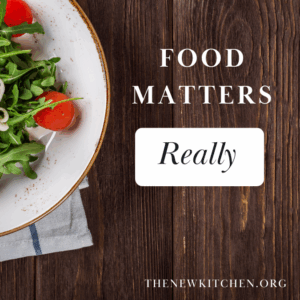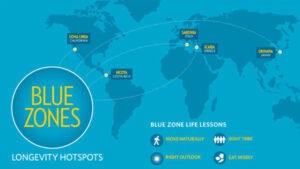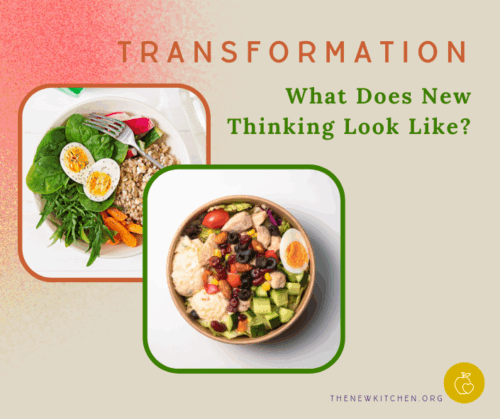This is the fourth of six articles on Transformation: Being New in Our Thinking. It’s time to see exactly what this deeper level, “new thinking” looks like, i.e., what do we believe to be worthwhile uses of our time?
The previous post explained the difference between surface level resources and the deeper level resource of our thinking. It showed how a deeper level shift in thinking is key to putting helpful surface level resources to work–like Instant Pots!
You could say that the first two Meal Making Transformation pieces, Being New in the Kitchen and Being New in our Kitchen, are both “surface level” solutions.
In other words, turning the kitchen into a healthy eating ally involves taking certain defined physical steps, like creating a helpful pantry, learning to shop with a list, getting in the habit of planning meals, and so on. Similarly, simplifying cooking involves learning a couple defined techniques and then utilizing them with a few basic recipes.
After many years sharing and teaching about Being New in the Kitchen and Being New in Our Cooking, I had to admit that there’s nothing too hard to understand about them. It became clear that devoting the time and effort to DO them is the challenging piece of the puzzle, and the piece that is driven by our deeper level thinking, i.e., what do we believe to be worthwhile uses of our time.
Value and Respect
So what does this deeper level thinking look like? Two key aspects lie at the heart of this new thinking: value and respect–for food, eating, the kitchen and cooking.
My research and experience in the field has revealed that value and respect are in short supply in today’s food world. This is understandable given the marketing directed at us over the last six or seven decades by a convenience food industry intent on keeping us out of the kitchen. By persuading us to steer clear of the stovetop, we became reliant on and eager purchasers of, convenience foods.
The downside, of course, is that our health has been seriously compromised as our diet has shifted to processed convenience foods and away from real, whole foods prepared at the kitchen stovetop.
I went right along with industry marketing, eating more and more processed foods and distancing myself further and further from the kitchen. Eventually, I came to view cooking as unexciting, unimportant and even irrelevant. I even became fairly embarrassed about spending time in the kitchen.
In other words, I had little to no value or respect for food, eating, the kitchen and cooking. I most certainly did not view it as a worthwhile use of my time.
This perspective was seriously challenged when we faced our health crisis–because it turned out that making and eating vegetable rich, allergen-free meals is what healed us!
Suddenly, I realized that food matters. Really.

And with that realization came the obvious realization that the ability to cook that food, the kitchen where I cooked it and the table where we shared it were also very, very important. In fact, they could be called “healing modalities.”
Of course these insights didn’t come right away. For quite some time, I ranted and railed against the seemingly unending chore of making healthy meals, three times a day, every day of the week. Meanwhile, all my friends were merrily dispensing with mealtimes by relying on takeout meals, fast foods and Friday night pizza. I felt terribly put upon!
What changed? Regaining my and my family’s health is what began shifting my perspective. How could I deny the connection between the food I was cooking and the amazing health we began experiencing? And unquestionably, that health was far more satisfying than any pizza, McDonald’s happy meal or drive-through burger!
It had been a long time since I just really felt good health, however. So until I experienced it, I couldn’t imagine it could be worth the effort of making our own, health-giving meals. So what a pleasant surprise to discover such a wonderful payoff for my meal making efforts!
I wonder if others have a hard time even imagining this kind of wonderful health payoff, simply because we can get so far removed from what true good health feels like.
At the outset, then, I valued the kitchen and cooking just because they delivered good health. Gradually, however, I also came to value and respect them in their own right, because they are part of our essential humanness, i.e., part of what we do to survive. For centuries and centuries, humans have been gratefully reaping the foods nature gives us and cooking them, even if only over an outdoor fire.
The Blue Zones
This thinking coincided with the discovery of the Blue Zones. Researchers had discovered several Blue Zones around the globe where people regularly live to over 100 with little to no chronic disease. A number of factors were discovered that contributed to this astounding outcome, from family and social connections to natural movement, and from relaxation and purpose to a healthy diet.

In terms of diet, of course the Blue Zone populations didn’t follow any particular “diet.” There were none of our modern diet and nutrition books, podcasts and studies imported into these traditional communities! Instead, these populations simply ate what every population ate in times past: They ate what nature provided in their locale since, again, foods weren’t shipped in from around the globe! Instead, people simply ate whatever they could fish, farm, raise, hunt or gather from their region. Naturally, then, their diets varied depending on locale.
Interestingly, I have seen many articles dissecting variations in the diets of different Zones to determine which of their foods are the magic elixirs that deliver good health. Regardless of what a particular population did or didn’t eat, however, the key fact is that diets in all the Zones were comprised of real whole foods. And those foods didn’t come in a microwaveable packages. They had to be cooked. That means someone was cooking them, day in and day out, year after year.
Clearly, then, cooking is a yet another key factor explaining health success in the Blue Zones (even if none of the expert research includes it!) Without that key activity, there would be no amazing Blue Zones populations.
This raises a critical question. I had felt so irritated and annoyed having to cook healthy meals three times a day, every day of the week. How did and do people in the Zones regularly cook their meals–and likely as not without a lot of aggravation and angst?
I’m guessing it is because, in the past, they didn’t have the luxury of stopping by a fast food joint down the street or microwaving a frozen meal! So as people have done for centuries, they cooked so they could survive! And because cooking was so central to survival it was naturally accorded great value and respect.
Even more interestingly, even though convenience foods are now available, these populations don’t seem to have been affected by convenience food marketing. They haven’t been convinced to believe that meal making is old-fashioned, trivial or irrelevant. So they have never been lured from the kitchen and the traditions of cooking their own meals from real, whole foods. Consequently, they have been spared the health ravages visited upon other populations by the advent of processed packaged foods that are admired because they require no or minimal cooking.
Just a Myth?
Reading about the Blue Zone made me wonder: The convenience food industry has led us to believe that cooking is inherently tedious and tiresome. But what if the industry’s portrayal of the kitchen and cooking isn’t objectively true? Is there actually any “evidenced based,” “scientific study” objectively proving cooking’s lack of value, impossible difficulty or inherently excessive time requirements?
Or is cooking’s negative reputation merely a subjectively created narrative–a myth–created by clever marketers?
Actually, there is nothing more reprehensible about cooking than any other of our daily activities, like driving to work, doing the laundry, feeding our pets, cleaning the house, gassing the car or grocery shopping. People have been cooking for centuries without it being considered a terribly onerous activity. And in terms of time, certainly the health-supporting activity of meal making is as worthwhile as all our TV and social media time!
However, creating a subjective narrative that de-values and denigrates cooking has an advantage for its marketing creators: It forces us into the processed convenience foods trap.
In the next email I’ll talk more about “normalizing” cooking, the role of limiting beliefs and a radical proposition for a new food world.
